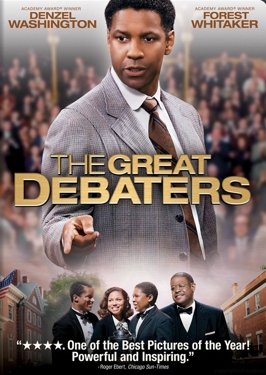
Product Description Two-time Academy Award® winner Denzel Washington (American Gangster) directs and stars with Academy Award® winner Forest Whitaker (Last King of Scotland) in this important and deeply inspiring page from the not-so-distant past (Richard Roeper, At the Movies with Ebert and Roeper). Inspired by a true story, Washington shines as a brilliant but politically radical debate team coach who uses the power of words to transform a group of underdog African American college students into an historical powerhouse that took on the Harvard elite. DVD Special Features:
Deleted Scenes
The Great Debaters: An Historical Perspective. That's What My Baby Likes; Music Video.
My Soul Is A Witness; Music Video
Theatrical Trailer
Sneak Peeks: Grace is Gone, Cassandra's Dream, I'm Not There, Hunting Party
Amazon.com Inspired by real events, the fascinating The Great Debaters reveals one of the seeds of the Civil Rights Movement in its story of Melvin B. Tolson (Denzel Washington in a captivating performance) and his champion 1935 debate club from the all-African-American Wiley College in Texas. Tolson, a Wiley professor, labor organizer, modernist poet, and much else, runs a rigorous debate program at the school, selecting four students as his team in ’35, among them the future founder of the Congress of Racial Equality, James Farmer Jr. (Denzel Whitaker). Washington, who directed The Great Debaters from a script by Robert Eisele (The Dale Earnhardt Story), anchors the story with the team’s measurable progress, but the film is also about the state of race relations in America at the height of the Great Depression. With lynchings of black men and women a common form of entertainment and black subjugation for many rural whites, the idea of talented and highly intelligent African-American young people learning to think on their feet during debates would seem almost a hopeless endeavor. But that’s not the way Tolson sees it, as his students serve themselves and the cause of racial equality in America with energetic arguments in favor of progressive government and non-violence as a viable social movement. There are some startling moments in this movie, particularly the sight of a man found lynched and burned to death, and an extraordinary moment in which we see black sharecroppers and white farmers engaged with Tolson in arguments about unionizing together. Forest Whitaker is outstanding as Farmer’s emotionally-reserved father, also a Wiley professor. This is the kind of film where one hopes two great actors such as the elder Whitaker and Washington will have a scene together, and when it comes it’s as powerful as one might hope. --Tom Keogh
